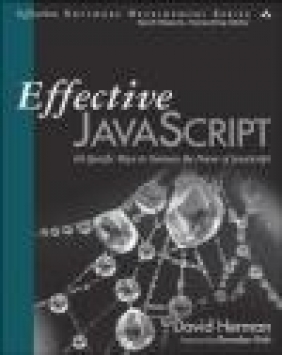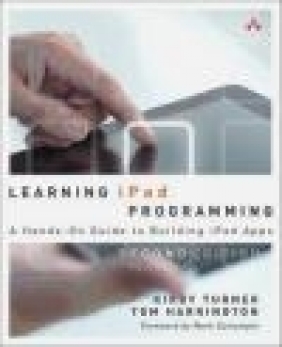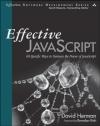Effective JavaScript
David Herman
Effective JavaScript
David Herman
- Producent: Addison Wesley Publishing Company
- Rok produkcji: 2012
- ISBN: 9780321812186
- Ilość stron: 240
- Oprawa: Miękka
Niedostępna
Opis: Effective JavaScript - David Herman
"It's uncommon to have a programming language wonk who can speak in such comfortable and friendly language as David does. His walk through the syntax and semantics of JavaScript is both charming and hugely insightful; reminders of gotchas complement realistic use cases, paced at a comfortable curve. You'll find when you finish the book that you've gained a strong and comprehensive sense of mastery." -Paul Irish, developer advocate, Google Chrome "This is not a book for those looking for shortcuts; rather it is hard-won experience distilled into a guided tour. It's one of the few books on JS that I'll recommend without hesitation." -Alex Russell, TC39 member, software engineer, Google In order to truly master JavaScript, you need to learn how to work effectively with the language's flexible, expressive features and how to avoid its pitfalls. No matter how long you've been writing JavaScript code, Effective JavaScript will help deepen your understanding of this powerful language, so you can build more predictable, reliable, and maintainable programs. Author David Herman, with his years of experience on Ecma's JavaScript standardization committee, illuminates the language's inner workings as never before-helping you take full advantage of JavaScript's expressiveness. Reflecting the latest versions of the JavaScript standard, the book offers well-proven techniques and best practices you'll rely on for years to come. Effective JavaScript is organized around 68 proven approaches for writing better JavaScript, backed by concrete examples. You'll learn how to choose the right programming style for each project, manage unanticipated problems, and work more successfully with every facet of JavaScript programming from data structures to concurrency. Key features include * Better ways to use prototype-based object-oriented programming * Subtleties and solutions for working with arrays and dictionary objects * Precise and practical explanations of JavaScript's functions and variable scoping semantics * Useful JavaScript programming patterns and idioms, such as options objects and method chaining * In-depth guidance on using JavaScript's unique "run-to-completion" approach to concurrency "Living up to the expectation of an Effective Software Development Series programming book, Effective JavaScript by Dave Herman is a must-read for anyone who wants to do serious JavaScript programming. The book provides detailed explanations of the inner workings of JavaScript, which helps readers take better advantage of the language." -Erik Arvidsson, senior software engineer "Before reading Effective JavaScript, I thought it would be just another book on how to write better JavaScript. But this book delivers that and so much more-it gives you a deep understanding of the language. And this is crucial. Without that understanding you'll know absolutely nothing whatever about the language itself. You'll only know how other programmers write their code. "Read this book if you want to become a really good JavaScript developer. I, for one, wish I had it when I first started writing JavaScript." -Anton Kovalyov, developer of JSHint "If you're looking for a book that gives you formal but highly readable insights into the JavaScript language, look no further. Intermediate JavaScript developers will find a treasure trove of knowledge inside, and even highly skilled JavaScripters are almost guaranteed to learn a thing or ten. For experienced practitioners of other languages looking to dive headfirst into JavaScript, this book is a mustread for quickly getting up to speed. No matter what your background, though, author Dave Herman does a fantastic job of exploring JavaScript-its beautiful parts, its warts, and everything in between." -Rebecca Murphey, senior JavaScript developer, Bocoup "Effective JavaScript is essential reading for anyone who understands that JavaScript is no mere toy and wants to fully grasp the power it has to offer. Dave Herman brings users a deep, studied, and practical understanding of the language, guiding them through example after example to help them come to the same conclusions he has. This is not a book for those looking for shortcuts; rather, it is hard-won experience distilled into a guided tour. It's one of the few books on JavaScript that I'll recommend without hesitation." -Alex Russell, TC39 member, software engineer, Google "Rarely does anyone have the opportunity to study alongside a master in their craft. This book is just that-the JavaScript equivalent of a time-traveling philosopher visiting fifth century BC to study with Plato." -Rick Waldron, JavaScript evangelist, BocoupForeword xiii Preface xv Acknowledgments xvii About the Author xix Chapter 1: Accustoming Yourself to JavaScript 1 Item 1: Know Which JavaScript You Are Using 1 Item 2: Understand JavaScript's Floating-Point Numbers 7 Item 3: Beware of Implicit Coercions 9 Item 4: Prefer Primitives to Object Wrappers 15 Item 5: Avoid using == with Mixed Types 16 Item 6: Learn the Limits of Semicolon Insertion 19 Item 7: Think of Strings As Sequences of 16-Bit Code Units 25 Chapter 2: Variable Scope 31 Item 8: Minimize Use of the Global Object 31 Item 9: Always Declare Local Variables 34 Item 10: Avoid with 35 Item 11: Get Comfortable with Closures 39 Item 12: Understand Variable Hoisting 42 Item 13: Use Immediately Invoked Function Expressions to Create Local Scopes 44 Item 14: Beware of Unportable Scoping of Named Function Expressions 47 Item 15: Beware of Unportable Scoping of Block-Local Function Declarations 50 Item 16: Avoid Creating Local Variables with eval 52 Item 17: Prefer Indirect eval to Direct eval 54 Chapter 3: Working with Functions 57 Item 18: Understand the Difference between Function, Method, and Constructor Calls 57 Item 19: Get Comfortable Using Higher-Order Functions 60 Item 20: Use call to Call Methods with a Custom Receiver 63 Item 21: Use apply to Call Functions with Different Numbers of Arguments 65 Item 22: Use arguments to Create Variadic Functions 67 Item 23: Never Modify the arguments Object 68 Item 24: Use a Variable to Save a Reference to arguments 70 Item 25: Use bind to Extract Methods with a Fixed Receiver 72 Item 26: Use bind to Curry Functions 74 Item 27: Prefer Closures to Strings for Encapsulating Code 75 Item 28: Avoid Relying on the toString Method of Functions 77 Item 29: Avoid Nonstandard Stack Inspection Properties 79 Chapter 4: Objects and Prototypes 83 Item 30: Understand the Difference between prototype, getPrototypeOf, and__proto__ 83 Item 31: Prefer Object.getPrototypeOf to __proto__ 87 Item 32: Never Modify __proto__ 88 Item 33: Make Your Constructors new-Agnostic 89 Item 34: Store Methods on Prototypes 92 Item 35: Use Closures to Store Private Data 94 Item 36: Store Instance State Only on Instance Objects 95 Item 37: Recognize the Implicit Binding of this 98 Item 38: Call Superclass Constructors from Subclass Constructors 101 Item 39: Never Reuse Superclass Property Names 105 Item 40: Avoid Inheriting from Standard Classes 106 Item 41: Treat Prototypes As an Implementation Detail 109 Item 42: Avoid Reckless Monkey-Patching 110 Chapter 5: Arrays and Dictionaries 113 Item 43: Build Lightweight Dictionaries from Direct Instances of Object 113 Item 44: Use null Prototypes to Prevent Prototype Pollution 116 Item 45: Use hasOwnProperty to Protect Against Prototype Pollution 118 Item 46: Prefer Arrays to Dictionaries for Ordered Collections 123 Item 47: Never Add Enumerable Properties to Object.prototype 125 Item 48: Avoid Modifying an Object during Enumeration 127 Item 49: Prefer for Loops to for...in Loops for Array Iteration 132 Item 50: Prefer Iteration Methods to Loops 133 Item 51: Reuse Generic Array Methods on Array-Like Objects 138 Item 52: Prefer Array Literals to the Array Constructor 140 Chapter 6: Library and API Design 143 Item 53: Maintain Consistent Conventions 143 Item 54: Treat undefined As "No Value" 144 Item 55: Accept Options Objects for Keyword Arguments 149 Item 56: Avoid Unnecessary State 153 Item 57: Use Structural Typing for Flexible Interfaces 156 Item 58: Distinguish between Array and Array-Like 160 Item 59: Avoid Excessive Coercion 164 Item 60: Support Method Chaining 167 Chapter 7: Concurrency 171 Item 61: Don't Block the Event Queue on I/O 172 Item 62: Use Nested or Named Callbacks for Asynchronous Sequencing 175 Item 63: Be Aware of Dropped Errors 179 Item 64: Use Recursion for Asynchronous Loops 183 Item 65: Don't Block the Event Queue on Computation 186 Item 66: Use a Counter to Perform Concurrent Operations 190 Item 67: Never Call Asynchronous Callbacks Synchronously 194 Item 68: Use Promises for Cleaner Asynchronous Logic 197 Index 201
Szczegóły: Effective JavaScript - David Herman
Tytuł: Effective JavaScript
Autor: David Herman
Producent: Addison Wesley Publishing Company
ISBN: 9780321812186
Rok produkcji: 2012
Ilość stron: 240
Oprawa: Miękka
Waga: 0.45 kg
























